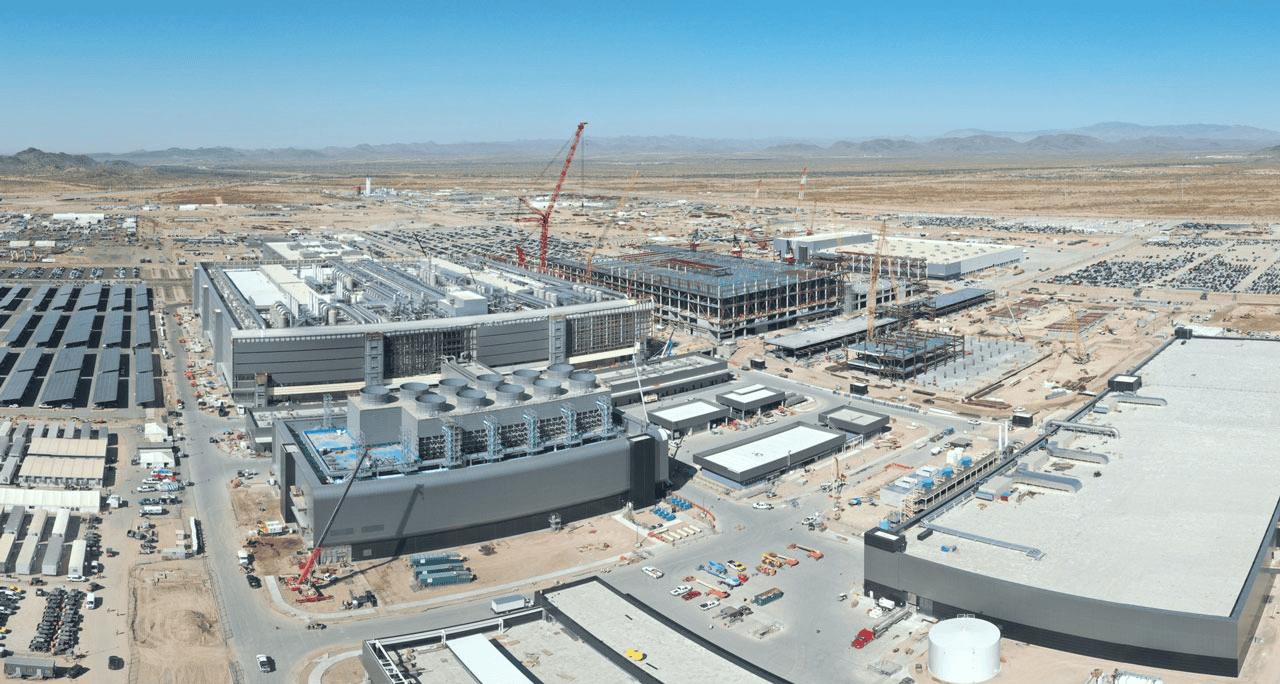Arizona has become a powerhouse in semiconductor manufacturing, attracting major investments and creating thousands of jobs. Since 2020, the state has secured over 40 semiconductor expansions, representing more than $102 billion in capital investment and over 15,700 direct jobs. This surge in growth has positioned Arizona as a leader in America’s semiconductor resurgence.
The state’s success stems from a combination of factors, including government support, skilled workforce, and strategic location. Companies like TSMC have chosen Arizona for their advanced chip production facilities, with TSMC Arizona set to receive up to $6.6 billion in CHIPS Act funding for its first plant. The company has also announced plans for a third fab, further solidifying Arizona’s position in the industry.
Arizona’s semiconductor boom extends beyond major manufacturers. The state has attracted numerous suppliers and related companies, creating a robust ecosystem for chip production. This growth has spurred innovation and economic development across the region, making Arizona a key player in the nation’s efforts to strengthen domestic semiconductor manufacturing capabilities.

Arizona’s Rise in Semiconductor Manufacturing
The Semiconductor Shift to Arizona
Arizona is rapidly becoming a major hub for semiconductor manufacturing in the United States. This surge is largely due to significant investments from industry giants like Intel and Taiwan Semiconductor Manufacturing Company (TSMC). These companies are building advanced fabrication plants (fabs) in the state, signaling a substantial shift in the semiconductor landscape.
Key Players and Their Investments
- Intel: Intel has been a long-time presence in Arizona and is significantly expanding its operations there. The company is investing billions of dollars in new fabs at its Ocotillo campus in Chandler. These fabs will produce advanced chips using cutting-edge process technology.
- TSMC: TSMC, the world’s largest contract chipmaker, is also building a major fab in Phoenix. This plant represents a substantial foreign direct investment in the U.S. semiconductor industry and will produce advanced chips for a variety of applications.
Reasons for Arizona’s Appeal
Several factors contribute to Arizona’s attractiveness for semiconductor manufacturing:
- Available Land and Infrastructure: Arizona offers ample land suitable for large-scale manufacturing facilities. The state also has existing infrastructure, including utilities and transportation networks, that support semiconductor production.
- Business-Friendly Environment: Arizona has a pro-business climate with tax incentives and streamlined regulatory processes that attract companies.
- Skilled Workforce: Arizona has a growing pool of skilled workers in engineering, technology, and manufacturing. Universities and community colleges in the state offer programs that train workers for the semiconductor industry.
- Climate: Arizona’s dry climate is beneficial for semiconductor manufacturing, as it reduces the risk of corrosion and other issues caused by humidity.
- Supply Chain Ecosystem: The presence of Intel and TSMC is attracting other companies in the semiconductor supply chain to Arizona, creating a robust ecosystem.
Economic Impact and Future Outlook
The investments in semiconductor manufacturing are having a significant positive impact on Arizona’s economy:
- Job Creation: The construction and operation of new fabs are creating thousands of high-paying jobs in engineering, manufacturing, and related fields.
- Economic Growth: The semiconductor industry is boosting Arizona’s economy through increased investment, spending, and tax revenue.
- Technological Advancement: The presence of advanced fabs is fostering innovation and technological advancement in the state.
Key Investments in Arizona’s Semiconductor Industry
| Company | Location | Investment (approx.) | Focus |
|---|---|---|---|
| Intel | Chandler | $32 Billion | Advanced Chip Manufacturing |
| TSMC | Phoenix | $65 Billion | Advanced Chip Manufacturing |
Intel is investing over $32 billion to build two advanced chip factories and modernize an existing facility in Chandler, Arizona. TSMC is planning to invest up to $6.6 billion through a memorandum with the U.S. Department of Commerce under the CHIPS and Science Act, aiming to construct a third fab at TSMC Arizona. This brings TSMC’s total investment in the Phoenix site to over $65 billion, making it the largest foreign direct investment in Arizona and the largest for a greenfield project in the U.S. TSMC’s Chairman emphasized that this investment will enhance support for U.S. customers and drive advancements in semiconductor technology.
Arizona’s emergence as a semiconductor powerhouse is a significant development for the U.S. technology industry. The state’s favorable conditions, combined with major investments from leading companies, position it for continued growth and innovation in this critical sector.
Key Takeaways
- Arizona has secured over 40 semiconductor expansions since 2020, totaling $102 billion in investments
- TSMC is building multiple fabs in Arizona, with significant government funding support
- The state’s semiconductor ecosystem includes manufacturers, suppliers, and related companies
Arizona’s Rise as a Hub for Semiconductor Manufacturing
The global demand for semiconductors, the tiny chips that power everything from smartphones to cars, is soaring. This demand is driving a major shift in where these crucial components are made, and Arizona is rapidly becoming a key player. The state is attracting massive investments from major chip manufacturers, transforming its economic landscape and solidifying its place as a center for advanced technology. This isn’t just about factories; it’s about the future of technology manufacturing in the United States.
Arizona has become a major center for semiconductor production in the United States. The state’s strategic investments, expansion of key industry players, and infrastructure developments have propelled its growth in this sector.
Strategic Investments and the Chips Act
The CHIPS and Science Act of 2022 has played a crucial role in Arizona’s semiconductor boom. This legislation provides $52 billion in subsidies for chip manufacturing and research. Arizona has leveraged these incentives to attract major investments.
The state has won over 40 semiconductor expansions since 2020. These projects represent more than $102 billion in capital investment. They are expected to create over 15,700 direct jobs in the industry.
Arizona offers additional tax credits and incentives to semiconductor companies. These benefits have made the state an attractive location for chip manufacturers.
TSMC and Intel’s Expansions in the Region
Taiwan Semiconductor Manufacturing Company (TSMC) has made a significant impact on Arizona’s semiconductor landscape. The company is investing $65 billion in new facilities in Phoenix. This marks one of the largest foreign investments in U.S. history.
TSMC’s Phoenix plant will produce advanced 3nm chips. These are among the most sophisticated semiconductors available.
Intel, another major player, is expanding its presence in Chandler, Arizona. The company is investing $20 billion to build two new factories. These facilities will enhance Intel’s capacity for advanced chip production.
Economic and Infrastructure Developments
Arizona’s semiconductor growth has spurred broader economic development. The Greater Phoenix Economic Council has helped locate 39 semiconductor-related companies to the region. These businesses have created more than 7,700 jobs.
The state is investing in infrastructure to support this industry growth. This includes improvements to transportation networks and power grids.
Arizona is also focusing on workforce development. Universities and community colleges are expanding programs in engineering and advanced manufacturing. These efforts aim to meet the increasing demand for skilled workers in the semiconductor industry.
Fostering Innovation and Workforce in Arizona
Arizona is building a robust ecosystem to support its growing semiconductor industry. The state is investing in education and research to create a skilled workforce and drive technological advancements.
Educational Initiatives for Workforce Training
The Arizona Commerce Authority leads efforts to develop a strong talent pipeline for the semiconductor industry. They collaborate with educational institutions to create specialized training programs.
Maricopa Community Colleges offer a registered apprenticeship program for semiconductor technicians. This hands-on training prepares students for high-tech careers.
The Future48 Workforce Accelerator provides short-term, intensive courses in semiconductor manufacturing. These programs help job seekers quickly gain industry-relevant skills.
Arizona State University has expanded its microelectronics programs. They offer degrees and certificates tailored to the needs of semiconductor companies.
Research, Development, and Innovation
Arizona State University plays a key role in advancing semiconductor technology. Their research labs focus on developing new materials and manufacturing processes.
The university partners with industry leaders to solve real-world challenges. These collaborations drive innovation in microelectronics and chip design.
Arizona’s semiconductor ecosystem encourages startups and entrepreneurship. Incubators and accelerators provide resources for new companies to develop cutting-edge technologies.
Research institutions in the state work on next-generation semiconductor applications. Their projects span areas like artificial intelligence, quantum computing, and advanced sensors.
Frequently Asked Questions
Arizona’s semiconductor industry is rapidly expanding, bringing significant economic impacts and job opportunities. Key players like TSMC are establishing major facilities, while the state offers various incentives to attract semiconductor firms.
What are the projected economic impacts of semiconductor manufacturing growth in Arizona?
Arizona’s semiconductor industry is expected to generate substantial economic benefits. The sector has already attracted over $102 billion in capital investment since 2020. This growth is creating thousands of high-paying jobs and stimulating local businesses.
The ripple effect extends beyond direct employment. Suppliers, service providers, and other related industries are experiencing increased demand. This economic boost is likely to continue as more semiconductor companies establish operations in the state.
When is the TSMC Arizona plant expected to be fully operational?
TSMC’s Arizona plant is a major development in the state’s semiconductor landscape. The facility is part of a $65 billion investment by the company. While exact timelines may vary, TSMC aims to begin production at its first Arizona fab in 2024.
The company plans to expand its presence with additional fabs in the coming years. This phased approach will gradually increase TSMC’s manufacturing capacity in Arizona.
How will the semiconductor industry’s expansion affect the job market in Arizona?
The semiconductor industry’s growth is creating a surge in job opportunities across Arizona. Since 2020, over 15,700 direct jobs have been added in the sector. These positions range from highly skilled engineering roles to manufacturing and support staff.
The job market is diversifying beyond direct semiconductor jobs. Supplier companies and related industries are also expanding, creating additional employment opportunities. This growth is attracting talent from across the country and fostering local workforce development programs.
Which semiconductor companies have announced plans to open facilities in Arizona?
Several major semiconductor companies have committed to opening facilities in Arizona. Taiwan Semiconductor Manufacturing Company (TSMC) is the most prominent, with its multi-billion dollar investment. Intel, a long-time Arizona resident, is also expanding its operations in the state.
Other companies establishing or expanding their presence include:
- Benchmark Electronics
- NXP Semiconductors
- ON Semiconductor
The state has attracted over 40 semiconductor-related expansions since 2020, indicating a broad range of companies investing in Arizona’s semiconductor ecosystem.
What incentives are being offered to semiconductor firms establishing operations in Arizona?
Arizona offers a variety of incentives to attract semiconductor companies. These include:
- Tax credits for job creation and capital investment
- Grants for workforce training programs
- Fast-track permitting processes
The state also provides infrastructure support, such as improvements to transportation networks and utilities. Local governments often offer additional incentives, including property tax abatements and site development assistance.
How does the climate in Arizona contribute to its suitability for semiconductor manufacturing?
Arizona’s climate offers several advantages for semiconductor manufacturing. The state’s low humidity helps maintain clean room environments, crucial for chip production. Arizona’s stable geological conditions minimize risks from earthquakes, which can disrupt sensitive manufacturing processes.
The abundance of sunlight in Arizona supports renewable energy initiatives. Many semiconductor companies are incorporating solar power into their operations, aligning with sustainability goals. The predictable weather patterns also contribute to consistent manufacturing conditions year-round.







